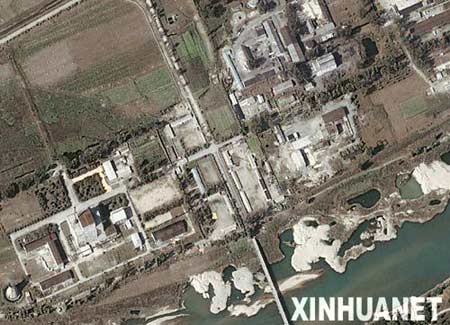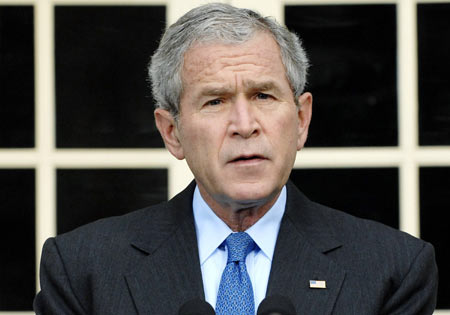The Democratic People's Republic of Korea (DPRK) submitted its nuclear declaration to the chair of the six-party talks Thursday afternoon, a step considered as "positive progress" in the process of the Korean Peninsula denuclearization.
 An image of Yongbyon nuclear center of DPRK is shown in this file photo dated Sept. 11, 2005.
An image of Yongbyon nuclear center of DPRK is shown in this file photo dated Sept. 11, 2005.
According to the Chinese Foreign Ministry, the DPRK ambassador to China Choe Jin Su submitted the declaration to Wu Dawei, China's top negotiator on the Korean Peninsula nuclear issue.
Prior to the submission, Wu held a press conference, reading a statement by the chair of the six-party talks, in which he said the United States would implement its obligations to remove the designation of the DPRK as a state sponsor of terrorism and to terminate the application of the Trading with the Enemy Acts.
"The talks have made positive progress in the second-phase actions for the implementation of the joint statement thanks to the concerted efforts by all the parties," Wu said.
He confirmed the parties, also including the Republic of Korea (ROK), Japan and Russia, agreed the declaration would be subject to verification and there was agreement within the parties on a set of principles to guide the establishment of a verification regime.
"We believe that the above-mentioned developments will be conducive to implementing the second-phase actions in a comprehensive and balanced manner, and the final realization of all the goals in the September 19, 2005 joint statement," said Wu, who is also China's vice foreign minister.
The United States welcomed the DPRK's declaration of its nuclear programs Thursday, calling it "an important step in the multistep process laid out in the six-party talks."
The White House said in a statement shortly after the submission that it would lift trade sanctions against the DPRK and remove the DPRK from its list of state sponsors of terrorism within 45 days.
"During this period, the United States will carefully assess DPRK's actions particularly with regard to verification," it said.
U.S. President George. W. Bush called the DPRK declaration "a positive step forward." But he said in a statement in the White House Rose Garden on Thursday "there's more work to be done and we've got the process in place to get it done in a verifiable way."
 U.S. President George W. Bush delivers a statement on North Korea at the White House in Washington June 26, 2008.
U.S. President George W. Bush delivers a statement on North Korea at the White House in Washington June 26, 2008.
On Friday afternoon, the DPRK is expected to blow up the cooling tower at its Yongbyon nuclear complex, with witnesses of U.S. officials and international television crews.
TV crews from the other five countries in the nuclear talks, invited by the DPRK to broadcast the toppling of the tower, arrived at Pyongyang Sunan international airport Thursday afternoon.

Sung Kim, director of the office of Korean affairs at the U.S. State Department, will travel to the DPRK, according to an official at ROK's Foreign Ministry on condition of anonymity.
Chinese experts made positive comments on DPRK's submission of nuclear declaration and the destruction of the tower.
"This is a pivotal step on the process of the denuclearization of the Korean Peninsula, which makes a sound atmosphere for the further talks," said Professor Zhang Liangui from the Central Party School which trains Communist Party of China (CPC) cadres.
"The cooling tower has been out of function since the disablement of the Yongbyon last year. But its destruction holds great symbolic significance."
These moves not only express the DPRK's determination of the denuclearization, but also rebuild the international society's confidence on the final resolution of the nuclear issue, Zhang said.
The DPRK and the United States have been engaged in a flurry of contacts recently despite a six-month delay of the declaration.
The world-renown New York Philharmonic made a historic performance in Pyongyang in February, the highest-level cultural exchange between the United States and the DPRK since the 1950-53 Korean War.
"The current DPRK-U.S. ties are the best in decades, which undoubtedly exerts a positive influence on the denuclearization," Qi Baoliang, a researcher at the China Institute of Contemporary International Relations.
But experts also warned the normalization of DPRK-U.S. diplomatic ties "still had a long way to go" and the process of the Korean Peninsula nuclear issue will continue to "face many obstacles."
Under an agreement reached at the six-party talks in Beijing on October 3, the DPRK agreed to abandon all nuclear weapons and programs and declare all its nuclear programs and facilities by the end of 2007, in exchange for diplomatic and economic incentives.
The six-party talks, launched in 2003, have so far held six rounds of talks in Beijing.
(Xinhua News Agency June 27, 2008)